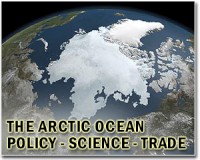| . |  |
. |
Copenhagen (AFP) May 17, 2011 Denmark which already counts Greenland and the Faroe Islands as its Arctic territories is planning to lay claim to the North Pole sea bed, Foreign Minister Lene Espersen said in a statement Tuesday. "We expect that Denmark will be able to document claims to an area that among other things includes the sea bed at the North Pole," Espersen said in a statement, stressing however that "the North Pole is not a goal in itself." Her comments came after a political online daily, Information, reported Tuesday it had obtained a copy of a foreign ministry strategy document detailing how Denmark planned to lay claim to the North Pole. Espersen confirmed that Denmark, Greenland and the Faroe Islands were working on drawing up an Arctic strategy for the next 10 years, adding the document would be published in mid-June. "It is not possible for me for the time being to comment on a strategy that is still being created and that also must be discussed with the parliamentary parties. That would not be proper," she said in the statement. As for expected claims to the North Pole, Espersen insisted that Denmark was "following the international rules of the game fairly closely." If Denmark's "Arctic Strategy 2011-2020" is adopted, the claims could put the Scandinavian country on a collision course with Russia, the United States, Canada and Norway. The five countries all have claims in the region, where melting polar ice and new technologies have made the "high north" easier to access and fueled competition for untapped oil and gas reserves. The Arctic seabed is thought to hold about 90 billion barrels of oil and 30 percent of the world's undiscovered gas resources, according to the US Geological Survey. The North Pole seabed itself is however not believed to hold large reserves, but appears to hold symbolic value for the countries in the region. In 2007 for instance, a Russian mini-submarine reached the bottom of the Arctic Ocean under the North Pole and planted a Russian flag, and Canada is also expected to make a claim in the area. "In the end, overlapping claims in the Arctic Ocean will need to be resolved through negotiations between the parties," Espersen said Tuesday. The Arctic and the Antarctic are the last major regions on earth where sovereignty remains unresolved. Countries bordering the Arctic currently are entitled to a 200 nautical mile economic zone from their coastlines, but claims for extending their territories will be decided under the United Nations Convention on the Law of the Sea (UNCLOS). UNCLOS requires countries laying new claims to present them within 10 years of ratifying the convention, something Denmark did in 2004.
Share This Article With Planet Earth
Related Links Beyond the Ice Age
 Canada PM's Arctic stand 'frosty rhetoric'
Canada PM's Arctic stand 'frosty rhetoric'Ottawa (AFP) May 13, 2011 Prime Minister Stephen Harper's tough talk on defending Canada's Arctic is apparently more bluster or "frosty rhetoric" than substantive, according to US cables leaked Friday. Harper's government has routinely touted Canadian sovereignty over the vast, desolate north as a "very high priority" and has publicly called for increased militarization of the Arctic to protect Canada's disputed clai ... read more |
|
| The content herein, unless otherwise known to be public domain, are Copyright 1995-2010 - SpaceDaily. AFP and UPI Wire Stories are copyright Agence France-Presse and United Press International. ESA Portal Reports are copyright European Space Agency. All NASA sourced material is public domain. Additional copyrights may apply in whole or part to other bona fide parties. Advertising does not imply endorsement,agreement or approval of any opinions, statements or information provided by SpaceDaily on any Web page published or hosted by SpaceDaily. Privacy Statement |